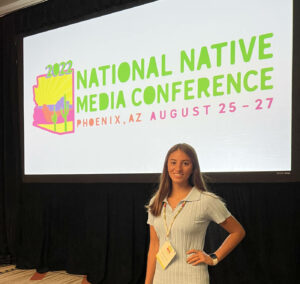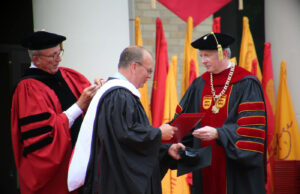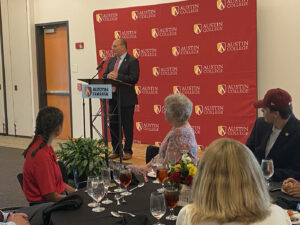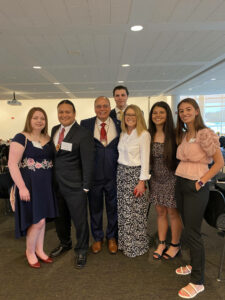I am an Austin College junior from Sherman, Texas; a citizen of the Chickasaw and Pawnee tribes; and an intern for Institutional Marketing and Communications at the College. As an intern, I hosted Chief Gary Batton, the 47th Chief of the Choctaw Nation, and his family when Austin College honored Chief Batton with an Honorary Doctor of Humane Letters degree during 2022 Commencement ceremonies.
This past summer, I was selected as a fellow for the Native American Journalists Association, where I attended seminars led by Indigenous j
My pursuits for my career and passion for my culture led me, on behalf of Austin College, to meet recently with Chief Batton and talk about his thoughts on connections among college students, Native Americans, and non-Natives; the use of the term Indigenous; and how those connections can develop into stories and relationships.
Stories and relationships often build through special days of recognition and celebration. The day after Thanksgiving is Native American Day, and for the Choctaw Nation, Choctaw Day is on the Chief’s birthday, which is December 15. The third largest tribe in the United States and one of the 39 tribes in Oklahoma, the Choctaw Nation finds no shortage of ways to honor its culture—a culture its people want to share with open arms.
When I asked Chief Batton about how Austin College can connect further with the Choctaw Nation, he said his recommendation is to “truly declare and have some type of formal participatory education to learn more about various tribes,” whether through social dances, Choctaw language teachings, stories about culture, stickball, or more.
However, Chief Gary Batton recognizes the possible anxiety and resistance those wanting to learn about the culture may feel, from not knowing Native American culture to which term to use (Native American, Indigenous People, Indian), but he reassures that those wanting to learn will be well-received by the Choctaw Nation.
“Don’t worry about offending us,” Chief Batton reaffirmed. “Just participate. If non-Indians would participate, they would feel so connected and would have such an appreciation for Choctaw or Indigenous people,” he said, adding that it does the Choctaw heart good to see people trying to learn about the culture and make connections with the tribe.
When it comes to different terms like Indigenous people and Native American, Chief Batton says he is pleased with any conversation or phrases that will support Native American history and the Choctaw story.
For Chief Batton, connections are important, and he and I connect through one story of tribal history. Chief Batton is Choctaw; I am Chickasaw. From one original tribe came the two tribes of Chickasaw and Choctaw. They split because two brothers, Chiksa’ and Chahta, went down different paths and became leaders of their respective groups, which became the Choctaw and Chickasaw tribes.
Chief Batton is ready to take the next step with Austin College students, and any other college students, in moving forward to form relationships and develop stories like the one now building between the chief, a Choctaw, and me, a Chickasaw.
“If we can get people to understand that we’re more than a casino—that we’re about our history, our culture, and our language, a foundation of trust can be built,” Chief Batton said. “Why not have someone come to campus to teach the Choctaw language, teach the Chickasaw language, do some of the social dances we have done? The more immersed you can be, the more you appreciate it.”
At the end of it all, Chief Batton just wants to see Austin College students learning from the Choctaw Nation and vice versa. When people interact, a new level of knowing one another occurs. “I think that’s part of the thing we do with inclusion: just respect one another,” Chief Batton said. “At the end of the day, if you just have genuine respect for somebody, no matter their race, color, religion, sexual preference, anything like that, things work out.”
In fact, Chief Batton proudly proclaimed, “One of our goals within the Choctaw Nation is that halito (hello) becomes as known worldwide as aloha.”
Chief Batton is saying “halito” to Austin College; let’s answer “halito” back!

Chief Batton receives his honorary doctorate from President Steven O’Day.

Chief Batton speaks at the Post-Commencement Brunch.

Chief Batton poses with his family and guests after the brunch celebration. Carrie is at far right.
Carrie Johnson is completing majors in English with a Creative Writing Emphasis and Media Studies. She also is a ’Roo athlete—and a member of the Chickasaw and Pawnee tribes.
